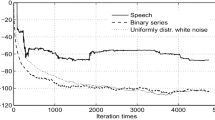Abstract
Filter decomposition approach has been presented for multichannel blind deconvolution of non-minimum phase systems [12]. In this paper, we present a flexible cascade structure by decomposing the demixing filter into a casual finite impulse response (FIR) filter and an anti-causal scalar FIR filter. Subsequently, we develop the natural gradient algorithms for both filters. Computer simulations show good learning performance of this method.
Access this chapter
Tax calculation will be finalised at checkout
Purchases are for personal use only
Preview
Unable to display preview. Download preview PDF.
Similar content being viewed by others
References
Amari, S.: Natural gradient works efficiently in learning. Neural Computation 10(2), 251–276 (1998)
Amari, S., Cichocki, A., Yang, H.H.: A new learning algorithm for blind signal separation. In: Tesauro, G., Touretzky, D.S., Leen, T.K. (eds.) Advances in Neural Information Processing Systems 8(NIPS 1995), pp. 757–763. The MIT Press, Cambridge (1996)
Amari, S., Douglas, S., Cichocki, A., Yang, H.: Novel on-line algorithms for blind deconvolution using natural gradient approach. In: Proc. 11th IFAC Symposium on System Identification, SYSID 1997, Kitakyushu, Japan, July 1997, pp. 1057–1062 (1997)
Amari, S., Chen, T.P., Cichocki, A.: Stability analysis of learning algorithms for blind source separation. Neural Networks 10(8), 1345–1351 (1997)
Bell, A.J., Sejnowski, T.J.: An information-maximization approach to blind separation and blind deconvolution. Neural Computation 7(6), 1129–1159 (1995)
Benveniste, A., Goursat, M., Ruget, G.: Robust identification of a nonminimum phase system: Blind adjustment of a linear equalizer in data communication. IEEE Trans. Automatic Control (25), 385–399 (1980)
Godard, D.N.: Self-recovering equalization and carrier tracking in two-dimensional data communication systems. IEEE Trans. Comm. (28), 1867–1875 (1980)
Labat, J., Macchi, O., Laot, C.: Adaptive decision feedback equalization: Can you skip the training period. IEEE Trans. on communication (46), 921–930 (1998)
Tong, L., Xu, G., Kailath, T.: Blind identification and equalization base on second-order statistics: A time domain approach. IEEE Trans. Information Theory (40), 340–349 (1994)
Tugnait, J.K., Huang, B.: Multistep linear predictors-based blind identification and equalization of multiple-input multiple-output channels. IEEE Trans. on Signal Processing (48), 26–28 (2000)
Waheed, K., Salam, F.M.: Cascaded structures for blind source recovery. In: 45th IEEE int’l Midwest Symposium on Circuits and Systems, Tulsa, Oklahoma, vol. 3, pp. 656–659 (2002)
Zhang, L.Q., Amari, S., Cichocki, A.: Multichannel blind deconvolution of non-minimum phase systems using filter decomposition. IEEE Trans. Signal Processing (2004) (in press)
Zhang, L.Q., Cichocki, A., Amari, S.: Multichannel blind deconvolution of nonminimum phase systems using information backpropagation. In: Proceedings of ICONIP 1999, Perth, Australia, November 16-20, pp. 210–216 (1999)
Author information
Authors and Affiliations
Editor information
Editors and Affiliations
Rights and permissions
Copyright information
© 2004 Springer-Verlag Berlin Heidelberg
About this paper
Cite this paper
Xia, B., Zhang, L. (2004). Multichannel Blind Deconvolution of Non-minimum Phase System Using Cascade Structure. In: Pal, N.R., Kasabov, N., Mudi, R.K., Pal, S., Parui, S.K. (eds) Neural Information Processing. ICONIP 2004. Lecture Notes in Computer Science, vol 3316. Springer, Berlin, Heidelberg. https://doi.org/10.1007/978-3-540-30499-9_184
Download citation
DOI: https://doi.org/10.1007/978-3-540-30499-9_184
Publisher Name: Springer, Berlin, Heidelberg
Print ISBN: 978-3-540-23931-4
Online ISBN: 978-3-540-30499-9
eBook Packages: Springer Book Archive




